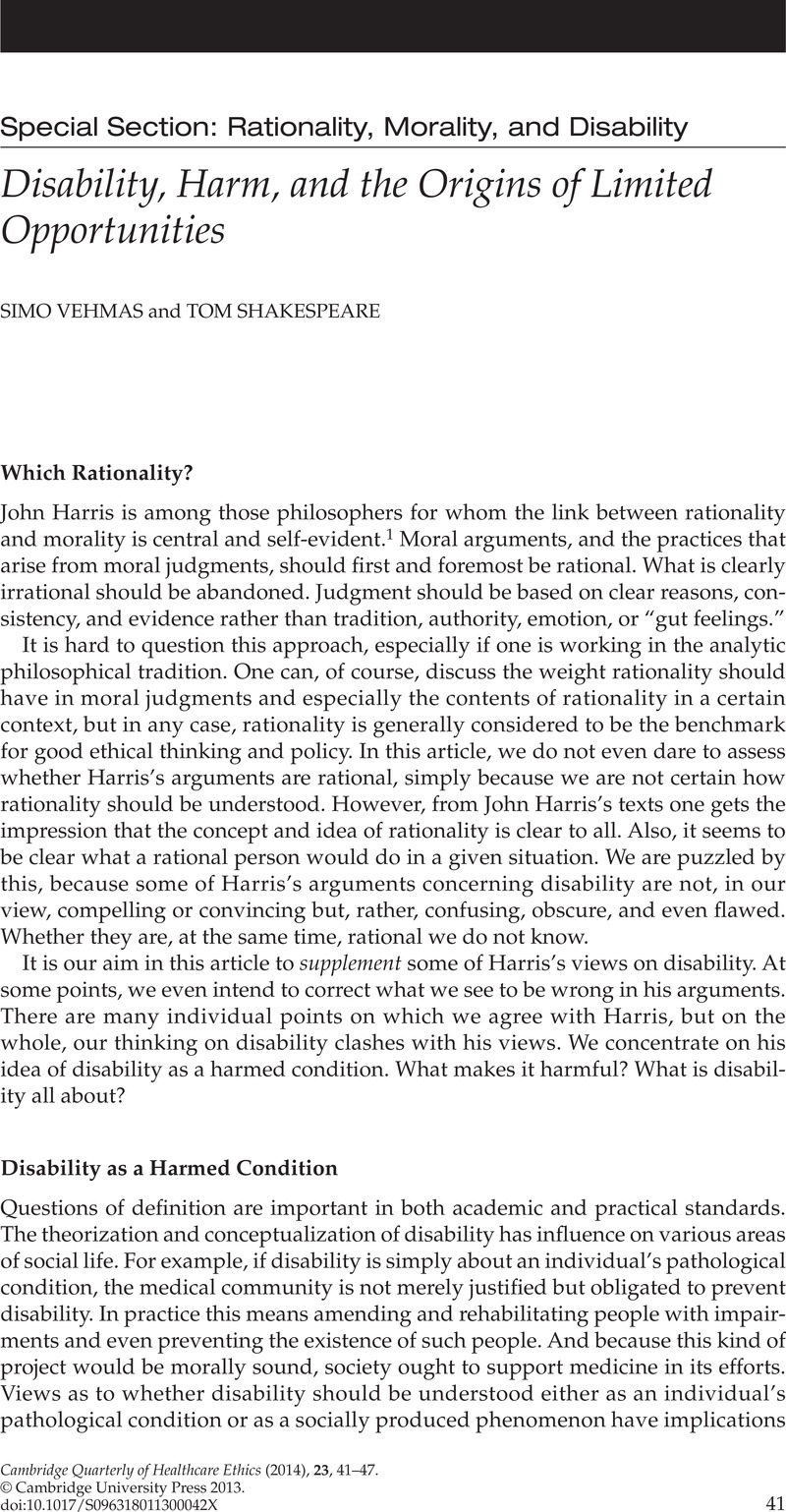Article contents
Disability, Harm, and the Origins of Limited Opportunities
Published online by Cambridge University Press: 20 November 2013
Abstract

- Type
- Special Section: Rationality, Morality, and Disability
- Information
- Copyright
- Copyright © Cambridge University Press 2013
References
Notes
1. See, e.g., Harris, J. Takala shoots herself in the foot. Cambridge Quarterly of Healthcare Ethics 2004;13(2):170–8.Google Scholar
2. Harris, J. Clones, Genes, and Immortality: Ethics and the Genetic Revolution. Oxford: Oxford University Press; 1998;Google ScholarHarris, J. Is there a coherent social conception of disability? Journal of Medical Ethics 2000;26(2): 95–100;Google ScholarHarris, J. One principle and three fallacies of disability studies. Journal of Medical Ethics 2001;27(6): 383–7.Google Scholar
3. See note 2, Harris 2001, at 384.
4. See note 2, Harris 2000, at 97.
5. Wasserman, D. Some moral issues in the correction of impairments. Journal of Social Philosophy 1996;27:128–45, at 133.Google Scholar
6. Vehmas, S. Ethical analysis of the concept of disability. Mental Retardation 2004;42(3): 209–22.Google Scholar
7. Sumner, LW. The subjectivity of welfare. Ethics 1995;105(4):764–90, at 767.Google Scholar
8. Vehmas, S. Newborn infants and the moral significance of intellectual disabilities. Journal of the Association for Persons with Severe Handicaps 1999;24(2): 111–21.Google Scholar
9. Parfit, D. Reasons and Persons. Oxford: Oxford University Press; 1986:499–502.CrossRefGoogle Scholar
10. Nussbaum, M. Nature, function, and capability: Aristotle on political distribution. Oxford Studies in Ancient Philosophy 1988 Suppl:145–84, at 175.Google Scholar
11. Steinbock, B. Disability, prenatal testing, and selective abortion. In: Parens, E, Asch, A, eds. Prenatal Testing and Disability Rights. Washington, DC: Georgetown University Press; 2000:108–23, at 112–13.Google Scholar
12. Bickenbach, J, Chatterji, S, Badley, EM, Üstün, TB. Models of disablement, universalism and the international classification of impairments, disabilities and handicaps. Social Science and Medicine 1999;48:1173–87.Google Scholar
13. Wittgenstein, L. Philosophical Investigations. Oxford: Blackwell; 1958.Google Scholar
14. Topliss, E. Provision for the Disabled. Oxford: Blackwell; 1979, at 16.Google Scholar
15. Zola, I. Towards the necessary universalizing of a disability policy. The Milbank Quarterly 1989;67 Suppl 2, Part 2:401–28.Google Scholar
16. Stevenson, RL. chapter 2. In: Virginibus Puerisque and Other Papers. London, UK: Chatto and Windus; 1897, at 37.Google Scholar
17. Kittay, EF. Love’s Labour: Essays on Women, Equality and Dependency. New York: Routledge; 1999, at 90.Google Scholar
18. Macintyre, A. Dependent Rational Animals: Why Human Beings Need the Virtues. London: Duckworth; 1999, at 130.Google Scholar
19. Sophocles. Oedipus at Colonus, part 15.
- 8
- Cited by


